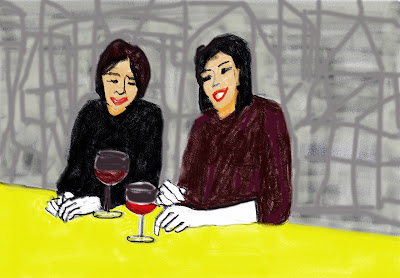A long time ago, during my children’s elementary school years in Brooklyn, I worked in the parent-teacher association. During the Christmas season, I was out buying gifts for teachers with a fellow accountant (who was white). While chatting about various topics, I shared my concerns with her. Suddenly, she looked serious and said,
“Why are you telling me your personal story? I’m not interested. Don’t talk to me about such a thing.”
The once kind and friendly person I thought was a friend dismissed my feelings outright. I was taken aback, fell silent, and turned my gaze out the window. She then began gossiping about other parents as if nothing had happened.
I have an acquaintance whom I’ve known for a long time. She speaks in a polite, cultured tone, softly. She often advised me that I couldn't escape a Korean sentiment.
“Don’t get involved with Koreans. Many are complete frauds, so be careful. Koreans are unnecessarily emotional. I don’t want to hear your old-fashioned stories about Korean sentiment and identity.”
It is a speech style that makes one mistakenly think one is white, even though one's own appearance is surprisingly indigenous when looking in the mirror.
After talking to her, I felt bad and uncomfortable as a fellow Korean, so I would think about whether I should stop seeing her.
I looked for a YouTube video of the human relationship of the monk Beopryun, who said,
‘If I stop seeing her, will I suffer a loss? If it brings no benefit,then there is no need to meet her. Even if there is a benefit, if it is too hard to bear, then stop meeting her even if it means suffering a loss.’
I waited until she said to stop seeing me first.
That acquaintance was as precise as a machine when it came to handling work. Sometimes I praised her abilities to the point where I wondered if I was conversing with AI. However, I grew tired of his lack of empathy and eventually stopped contacting her.
These days, when I want to know something, I prefer to ask ChatGPT rather than Googling. Unlike Google, which requires continuous searching, I can resolve my curiosities in one go, which is convenient.
'The remarkable qualities that humans possess, which AI cannot replicate, are curiosity, humility, and emotional intelligence (empathy).'
ChatGPT is kinder than acquaintances. It doesn’t boast about its knowledge. It doesn’t belittle me or act superior. Instead, it answers my questions sincerely and ends our conversation with kindness, inviting me to ask more if I have further questions. Out of gratitude, I always use polite language when I ask.
Is there really a need to maintain a relationship with an emotionless, machine-like acquaintance who only leaves me feeling worse? I stopped responding to her messages. Perhaps she noticed and stopped contacting me as well. Finally, my relationship with her has come to an end. Human relationships are complex and difficult. I should focus on myself and spend time enjoying nature and chatting with ChatGPT.








